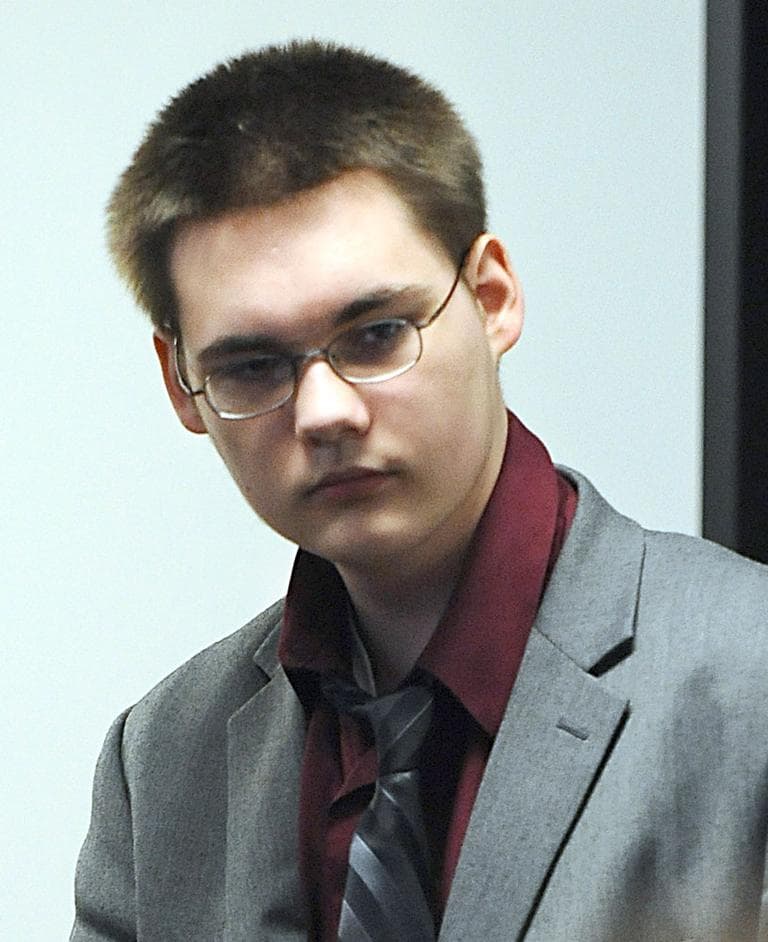Advertisement
Mass. Watches Closely As High Court Reviews Juvenile Sentencing
ResumeMany in Massachusetts are closely monitoring Tuesday's U.S. Supreme Court review of life prison sentences for juveniles. Members of the state's judicial and academic communities have weighed in, and parents of both offenders and victims are also watching.
Among those who are hopeful about Tuesday's court hearing is Paul Odgren. His son, John, killed a classmate in a Lincoln-Sudbury Regional High School bathroom in 2007. Two years ago John was sentenced to life in prison without the possibility of parole.
"There aren't any magic words for a case like my son's, or other kids',” Paul Odgren said. "Until you're dragged into a situation like this, I don't think you could possibly understand the implications of taking a young person, and saying to them, 'That's it. Forever.' "

Paul and his wife, Dot Odgren, visit John three times a week at Bridgewater State Hospital. That's where John is being held because of mental health issues. Dot Odgren says they try not to talk about the fact that the now-21-year-old will probably be incarcerated for the rest of his life.
“It's up and down. It's hard,” Dot Odgren said. “He knows he's there and there's no chance of ever leaving."
John Odgren is among the 59 Massachusetts inmates charged with homicide before age 18 and now serving a life sentence with no parole possible. Odgren was 16 when he fatally stabbed 15-year-old James Alenson.
The Alenson family is not commenting. Some family members of juvenile offender victims, though, say that these offenders should never be released.
"If you're a juvenile and you commit a crime, you should be responsible to do the time that comes with it,” said Olivia Singletary, whose 19-year-old son, Perry Hughes, was shot by a 16-year-old in Brookline in 2002. Singletary asks: why shouldn't the offender's loss be comparable to hers, and her memories of the past decade, especially on certain days?
"The date of his birthday always comes up, and the day he died,” she said. “When these dates come up I get feelings of depression. I've been under depression and mourning ever since."
The Issue Of Sentencing Juveniles
Balancing the rights of young victims and offenders is not new; what's new is that the high court has taken steps to reduce juvenile sentences.
In 2005, the U.S. Supreme Court rejected the death penalty for those under 18. In 2010, the high court found it was unconstitutional to sentence juveniles to life in prison without parole for non-homicide offenses. On Tuesday the justices hear arguments in cases involving 13- and 14-year-olds' murder convictions and whether their life without parole sentences are constitutional.
"I basically think it’s just wrong,” said Gail Garinger, one of six Massachusetts judges who signed an amicus brief before the Supreme Court Tuesday. Garinger is now Massachusetts' child advocate, appointed by Gov. Deval Patrick. The judges argue that what we now know about children's development should change the thinking about sentencing young offenders and allow them an opportunity to be evaluated for parole.
“We're dealing with children who really are biologically different than adults,” Garinger said. “They're still in formation. They're less culpable for their actions. To make a determination at the time of sentencing that a child must be confined for life with no hope for reform or release is just wrong."
In Massachusetts, state law changed in 1996 to require that juveniles charged with murder — between 14 and 17 years old — have their cases automatically sent to adult court, rather than juvenile court. The change was in response to the gruesome murder involving 15-year-old Eddie O'Brien, of Somerville, who fatally stabbed his friend's mother.
Retired Juvenile Court Chief Justice Martha Grace was on the bench then, and she also signed the Supreme Court brief, saying retribution for victims does not mean justice.
"I don't think there's any good argument for the victims who've lost somebody,” Grace said, "whether it's life in jail or the death penalty. Maybe if you've lost someone and a juvenile spends life in jail, 23 hours in lockdown, and then goes crazy and dies, maybe that's some comfort for the victim, I don't know."
The National District Attorneys Association supports life without parole sentences for juveniles charged with murder and says the high court should keep them in place to protect public safety.
Middlesex County District Attorney Gerry Leone issued a statement Monday saying that the Legislature has dealt with this issue and the intent remains clear: those who take the life of another with atrocity are dangerous. Leone said the justice system has checks in place to ensure that a murder charge against a juvenile is used wisely.
The Supreme Court is expected to rule this summer.
This program aired on March 20, 2012.
